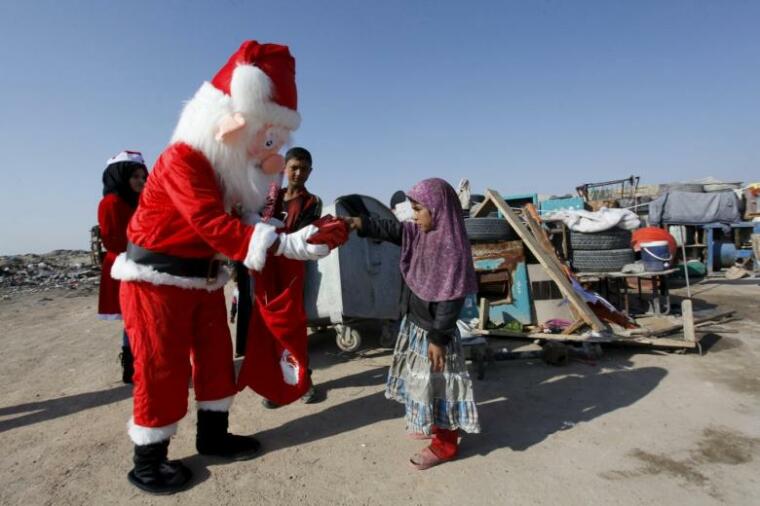Muslim businessman sets up giant Christmas tree in Baghdad to show unity with Christians

As the battle to defeat the Islamic State (IS) rages in northern Iraq, a Muslim businessman in Baghdad is sending out a message of unity by erecting the tallest Christmas tree in the city.
Yassir Saad said that his goal is to join "our Christian brothers in their holiday celebrations and helping Iraqis forget their anguish, especially the war in Mosul," AP reported.
The tree, which stands at 85 feet, with a diameter of 33 feet, was placed at the center of the Al-Zawra Park in Baghdad. The businessman said that it cost around US$24,000.
The Christian population in Iraq has declined significantly since the U.S.-led invasion in 2003. According to Christian Today, it was estimated that there were 1.5 million Christians in the country in 2003. The number of Christians living in Iraq is now believed to be as low as 200,000.
Thousands of Christians fled from Mosul and surrounding regions when ISIS overran northern Iraq in 2014. Christians were forced to convert to Islam or pay a special tax, and they often saw their properties confiscated by the terror group.
Saba Ismael, a teacher who took their students to see the Christmas tree said: "This tree represents love and peace. I wish all Iraqi Christians could return to Iraq and live normal and peaceful lives."
Many Christians have managed to return to the villages recaptured by Iraqi forces only to find their homes and churches in ruins.
The Nineveh Protection Units (NPU) and Iraqi Special Forces have recently liberated the villages of Bashiqa, Bartella, Karamles, Qaraqosh, and Tellisqof, but the villages were devasted by ISIS.
Most of the infrastructure in some of the towns has been reduced to rubble. Other villages became a dumping ground for dangerous chemical compounds.
Robert Nicholson, executive director of the Philos Project, said that rebuilding the towns could take years, and he added that funding is badly needed.
"The road is long, but the journey is made up of single steps. We need to start small, focusing on the most important villages and work outward," he said, according to Fox News.
"We need the international community to step in. All those countries in Europe and around the world that talk about preserving minority peoples, indigenous peoples, need to step up and put their money where their mouth is," he continued.
 Christians don't have to affirm transgenderism, but they can’t express that view at work: tribunal
Christians don't have to affirm transgenderism, but they can’t express that view at work: tribunal Archaeology discovery: Medieval Christian prayer beads found on Holy Island
Archaeology discovery: Medieval Christian prayer beads found on Holy Island Presbyterian Church in America votes to leave National Association of Evangelicals
Presbyterian Church in America votes to leave National Association of Evangelicals Over 50 killed in 'vile and satanic' attack at Nigerian church on Pentecost Sunday
Over 50 killed in 'vile and satanic' attack at Nigerian church on Pentecost Sunday Ukrainian Orthodox Church severs ties with Moscow over Patriarch Kirill's support for Putin's war
Ukrainian Orthodox Church severs ties with Moscow over Patriarch Kirill's support for Putin's war Islamic State kills 20 Nigerian Christians as revenge for US airstrike
Islamic State kills 20 Nigerian Christians as revenge for US airstrike Man who served 33 years in prison for murder leads inmates to Christ
Man who served 33 years in prison for murder leads inmates to Christ


 Nigerian student beaten to death, body burned over ‘blasphemous’ WhatsApp message
Nigerian student beaten to death, body burned over ‘blasphemous’ WhatsApp message 'A new low': World reacts after Hong Kong arrests 90-year-old Cardinal Joseph Zen
'A new low': World reacts after Hong Kong arrests 90-year-old Cardinal Joseph Zen Iran sentences Christian man to 10 years in prison for hosting house church worship gathering
Iran sentences Christian man to 10 years in prison for hosting house church worship gathering French Guyana: Pastor shot dead, church set on fire after meeting delegation of Evangelicals
French Guyana: Pastor shot dead, church set on fire after meeting delegation of Evangelicals ‘Talking Jesus’ report finds only 6% of UK adults identify as practicing Christians
‘Talking Jesus’ report finds only 6% of UK adults identify as practicing Christians Mission Eurasia ministry center blown up in Ukraine, hundreds of Bibles destroyed: 'God will provide'
Mission Eurasia ministry center blown up in Ukraine, hundreds of Bibles destroyed: 'God will provide' Church holds service for first time after ISIS desecrated it 8 years ago
Church holds service for first time after ISIS desecrated it 8 years ago Burger King apologizes for 'offensive campaign' using Jesus' words at the Last Supper
Burger King apologizes for 'offensive campaign' using Jesus' words at the Last Supper Uganda: Muslims abduct teacher, burn him inside mosque for praying in Christ’s name
Uganda: Muslims abduct teacher, burn him inside mosque for praying in Christ’s name